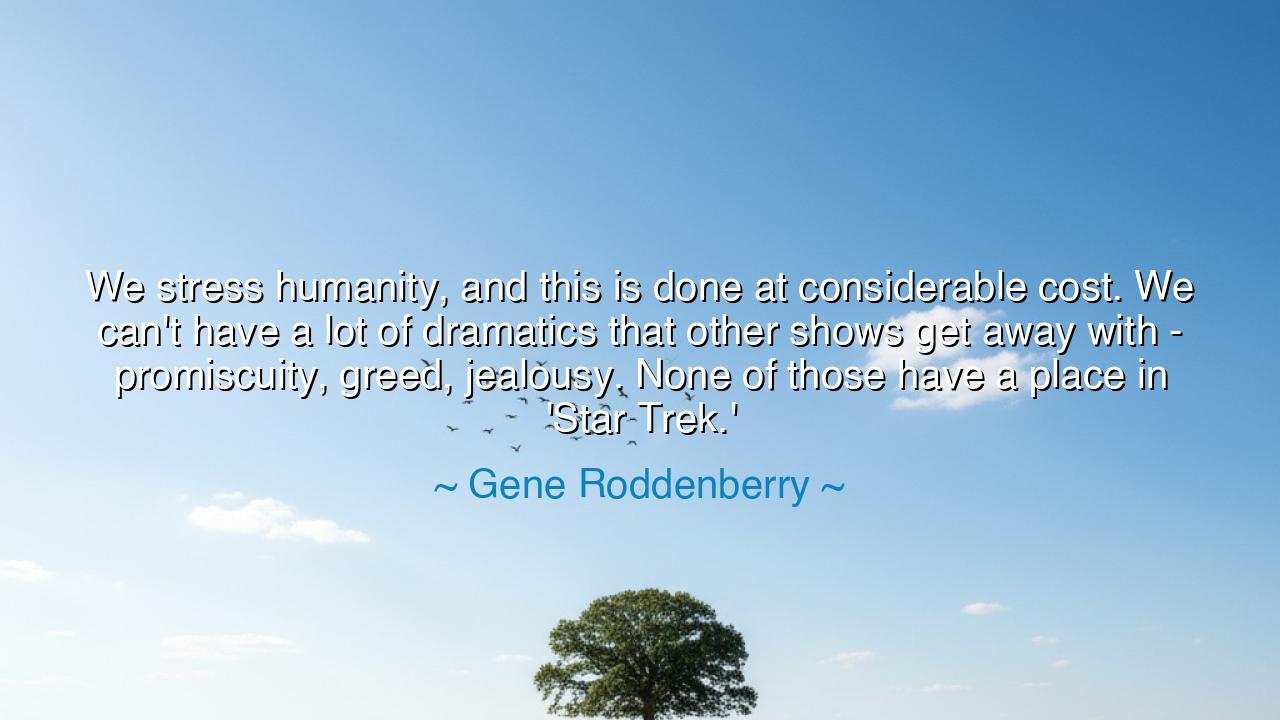
We stress humanity, and this is done at considerable cost. We
We stress humanity, and this is done at considerable cost. We can't have a lot of dramatics that other shows get away with - promiscuity, greed, jealousy. None of those have a place in 'Star Trek.'






In the visionary words of Gene Roddenberry, creator of Star Trek, there gleams a declaration both idealistic and defiant: “We stress humanity, and this is done at considerable cost. We can’t have a lot of dramatics that other shows get away with — promiscuity, greed, jealousy. None of those have a place in ‘Star Trek.’” These are not the words of a mere storyteller, but of a prophet who dared to dream of a nobler humanity. In an age when television thrived on conflict and spectacle, Roddenberry chose instead to build a world of hope, a universe where men and women had transcended their baser instincts. His was a rebellion not of technology, but of spirit — the belief that humanity, through reason and compassion, could rise above the pettiness that once bound it to the dust.
To understand the meaning of his words, we must look to their origin — the mid-twentieth century, a time shadowed by war, fear, and division. The world had witnessed the horrors of Hiroshima and the long shadow of the Cold War. Amid such turmoil, Roddenberry imagined a future not of conquest, but of unity — a Federation where people of every race and planet worked together in peace. When he said, “We stress humanity,” he meant not the flaws of humankind, but its potential — the capacity for wisdom, for empathy, for transcendence. Star Trek was not meant to mirror the world as it was, but to reflect the world as it might one day be.
Yet such vision came at a cost. As Roddenberry himself admitted, the refusal to indulge in promiscuity, greed, and jealousy — those favorite fuels of entertainment — meant sacrificing easy drama for higher purpose. While other stories found passion in betrayal and lust, Star Trek found meaning in exploration, in moral choice, in the eternal question of what it means to be human. The cost, then, was not only commercial but artistic — the discipline to forgo shallow conflict in pursuit of profound truth. In this, Roddenberry stood like a sculptor who carves not chaos but harmony, shaping a future where humanity has finally learned to govern its desires.
In many ways, his vision mirrors the teachings of the ancient philosophers. The Stoics of Greece and Rome, like Marcus Aurelius and Epictetus, taught that man’s greatness lies in mastering himself, not the world around him. They, too, sought to banish jealousy and greed from the human heart, knowing that these passions are chains that bind the spirit. Roddenberry’s starfarers — men and women who travel among the stars without prejudice or greed — are the children of those same ideals. They are the philosopher-kings of the cosmos, explorers of both galaxies and conscience. Through them, he revived the ancient belief that wisdom, not wealth, defines civilization.
Consider, too, the story of Captain James T. Kirk, whose conflicts are not with petty human rivals, but with moral paradoxes — the struggle between duty and compassion, freedom and order. When he stands against enemies, he does so not out of hatred, but understanding. When he faces the unknown, he meets it not with fear, but curiosity. This is Roddenberry’s humanity — the courage to rise above jealousy, the humility to seek knowledge, the wisdom to honor life in all its forms. In this, Kirk and his crew embody the ancient heroes — not those who conquer nations, but those who conquer themselves.
And yet, Roddenberry’s words carry a warning. To “stress humanity” is not an easy path. It demands restraint in a world that thrives on spectacle, and faith in an audience that longs for something deeper than mere sensation. In choosing this path, Roddenberry reminded us that art is not only reflection, but aspiration. The storyteller has the power to shape the soul of the age — to teach through imagination, to heal through hope. He believed that by depicting a world free of greed and jealousy, he could help build one. Thus, Star Trek became not merely fiction, but philosophy made flesh, a dream of humanity perfected through struggle and reason.
The lesson, therefore, is both ancient and urgent: to rise above the lower passions, to seek greatness through virtue, and to create worlds — real or imagined — that call forth the best within us. Let your own life be like Roddenberry’s starship — always seeking, always learning, driven not by envy or desire, but by wonder. Do not delight in the drama of destruction, but in the quiet heroism of understanding. For though the stars may be infinite, the greatest frontier lies within the human soul.
So remember, as Roddenberry taught, that humanity is not a flaw to be endured, but a destiny to be fulfilled. The cost of this vision is great — it asks us to abandon the easy stories of lust and greed for the harder journey of growth and compassion. Yet it is a cost worth paying. For when we shed the petty chains of jealousy and ego, we rise — not only among the stars, but within ourselves. And that, truly, is the voyage of a lifetime.






AAdministratorAdministrator
Welcome, honored guests. Please leave a comment, we will respond soon